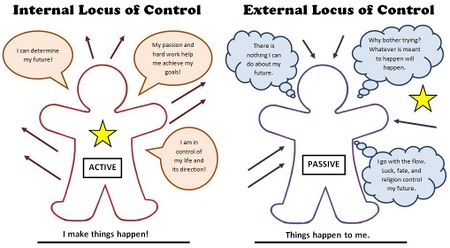Locus of control
Overview
Based on Martinez[1], locus of control can be explained in two contrasting styles–internal locus of control and external locus of control. Internal locus of control refers to a person who thinks he/she has control over whatever happens to them–either good or bad. On the contrary, external locus of control refers to someone who believes he/she is being controlled by external forces and has no power over their circumstances.
Martinez[1] explains that internal locus of control is associated with the term ‘origin’, and external locus of control associates with the term ‘pawn’. Martinez further explains that those who are extremely passive about their lives are victims of what is called ‘learned helplessness’. Locus of control is important among the psychology community because it impacts our daily lives and influences our thoughts that may affect our actions[2].
Evidence
In a study related to health from CDC[3], a research was done for a group of youths of ages between 6 and 17 with chronic diseases to discover the relationship between locus of control and their health conditions. The results of the research discovered that a stronger internal LOC(locus of control) was associated with improved outcomes, and a stronger external LOC was linked to poorer outcomes[3]. This research also states an example of implementing a pain management program as a way to increase internal locus of control which allows patients to shift their beliefs toward feeling more in control of their own health condition.
This suggests that identifying the type of Locus of Control is highly valuable in regards to health care because knowing the outcomes of a type of locus of control may provide possible countermeasures for health care organizations that can be taken to improve health conditions of their patients.
Internal Locus of Control
[here]
External Locus of Control
[here]
Characteristics
[here]
Discover Your Locus of Control
[here]
Origin and Pawn
[here]
Example
[here]
Learned Helplessness
[here]
Evidence
Motivational Deficit
[here]
Cognitive Deficit
[here]
Emotional Deficit
[here]
Examples
[here]
Consequences and Treatment
[here]
Challenges and Further Consideration
[here]
References
- ↑ 1.0 1.1 Martinez, M. E. (2010). Emotion, Motivation, and Volition. In Learning and Cognition: The Design of the Mind (pp. 153–188). Boston: Merrill. http://books.google.com/books?id=wqFWAAAAYAAJ
- ↑ What Is Locus Of Control: And How It Affects Your Mind. (n.d.). Mind Help. https://mind.help/topic/locus-of-control/
- ↑ 3.0 3.1 Nazareth, M., Richards, J., Javalkar, K., Haberman, C., Zhong, Y., Rak, E., Jain, N., Ferris, M., & van Tilburg, M. A. (2016). Relating Health Locus of Control to Health Care Use, Adherence, and Transition Readiness Among Youths With Chronic Conditions, North Carolina, 2015. Preventing Chronic Disease, 13. https://doi.org/10.5888/pcd13.160046

